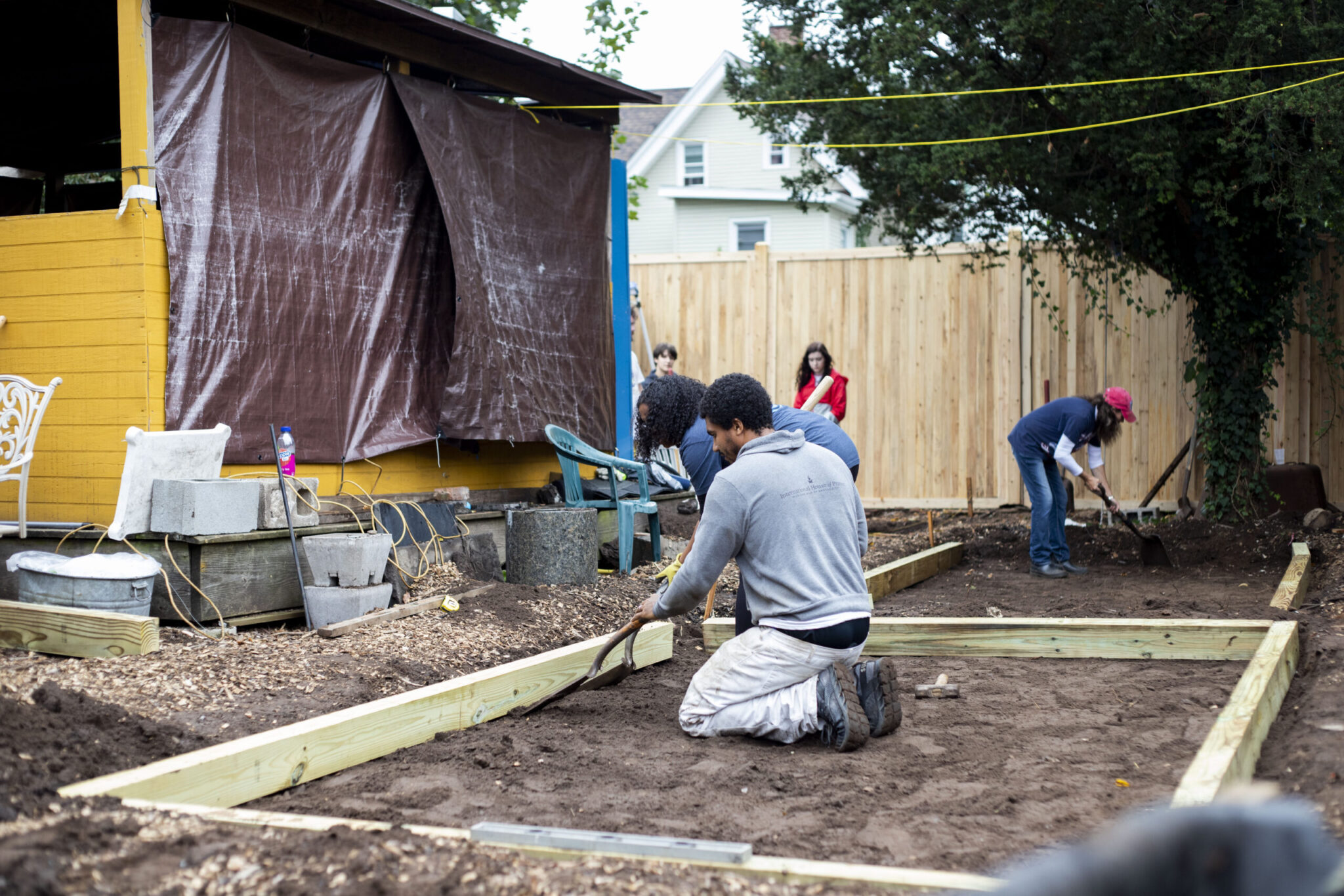After receiving second city order to remove tiny homes, homelessness activist discusses next steps
Mark Colville, founder of the Rosette Village Neighborhood Collective, maintained that he would not comply with the city’s request.

Maggie Grether, Contributing Photographer
Mark Colville received a second housing code violation letter from the City Plan Department last week, demanding once again that Colville dismantle the new construction of six tiny homes built for unhoused people in his backyard.
Despite the city’s claims that the construction violated both city zoning codes and state building codes, Colville remains opposed to complying with the city’s demands.
“We have people living in these homes already,” Colville said. “The last thing that we’re ever going to do is evict them.”
The second letter, dated Oct. 27, arrived at Colville’s home in the Hill neighborhood a few days after he received the first cease-and-desist order from the City Plan Department, dated Oct. 24. The letters, which were obtained by the News, outlined six violations of zoning and housing codes, including the erection of the tiny homes and the installation of a fence without the required permits.
Colville dismissed these accusations as inaccurate representations of the project. While city officials expressed a desire to support Colville in obtaining legal permits for the tiny homes, Colville said that current zoning codes are “outdated” and maintained that the city ought to alter its policies to better serve residents in light of the ongoing housing crisis.
According to the letter, the tiny homes exhibit “solid fuel heating sources” without a method of smoke or carbon monoxide detection, which makes them in violation of the 2022 Connecticut State Building Code. The letter also states that the homes do not possess any utility approvals or hookups, which include access to plumbing and electricity.
Colville responded to these accusations, claiming that the tiny homes are equipped with both smoke and carbon monoxide detectors. He said that the detectors are not functional because the city cut off electricity to the tiny homes.
According to Colville, the smoke and carbon detectors are hooked up to an electricity box in the backyard of his home at 203 Rosette St., which the Collective received a permit to install. However, Collville said that the city did not issue a final approval to allow for the flow of electricity to the tiny homes.
Because of the lack of electricity, members of the Rosette Village Neighborhood Collective — the unhoused community who helped install the houses — bought smoke detectors that run on batteries as an alternative to the ones that are built into the tiny homes and require electricity to operate.
“Saying that these things are a fire hazard … it’s a lie,” Colville said.
Despite city opposition to the project’s zoning and building code violations, city officials expressed support for Colville’s initiative.
“I am in support of all initiatives or individuals helping,” Ward 4 Alder Evelyn Rodriguez, who represents 203 Rosette St., wrote in a text to the News.
Rodriguez also mentioned that other projects looking to address homelessness — including the Days Inn for Homeless Shelter Initiative and the Christian Community Action Agency — have complied with city and state ordinances. She wrote that these compliances are a “commitment to those in need.”
Colville also received a letter from Executive Director of the City Plan Department Laura Brown in mid-September, expressing support for the construction and a desire to help the Collective acquire permits to ensure that the construction fit within city zoning codes.
In a previous interview with the News, Mayor Justin Elicker said that applying for a zoning variance — which would grant the Collective an exception to city zoning codes — would legalize the construction of the tiny homes, if the application is approved by the city’s Board of Zoning Appeals.
Shannon Carter SPH ’22, who is working with Colville and the Collective, said that the group would like to pursue a zoning variance. Apart from the variance, Carter said that there is not currently any alternative within the law that explicitly offers a “pathway forward” without a lengthy waiting process.
City Building Official Robert Dillon, who signed the second cease-and-desist letter, said that the tiny homes violate building codes — which unlike zoning codes, are associated with the state of Connecticut rather than the city. Applying to challenge the building codes, he explained, is a process that would have to be approved at a state level.
“As a building official, I’ll continue to try and find a pathway and have discussions with the property on 203 Rosette Street,” he said. “I think I’ve demonstrated that throughout.”
Ultimately, Colville said, he hopes that the city will change zoning codes to better serve the needs of unhoused New Haveners.
Colville pointed to the legal installation of tiny homes in over 100 communities across the country, claiming that zoning codes in New Haven ought to reflect those within other cities that allow for tiny home construction.
“The contention is that the zoning law that currently exists is extremely outdated, and doesn’t reflect the current needs of the population,” Carter said.
The Collective finished construction on the tiny homes on Oct. 21.
Correction, Nov. 27: In a previous version of this article, Mark Colville’s name was spelled incorrectly. The article has been updated to reflect the correct spelling.







